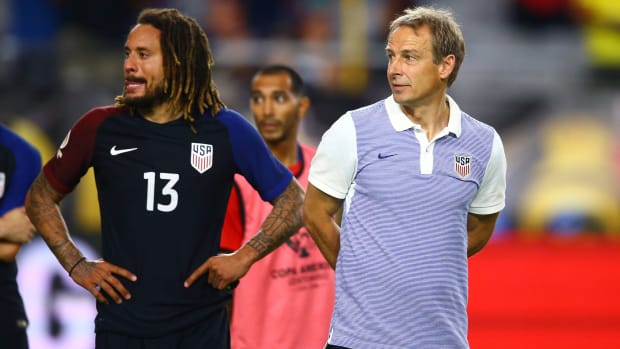Jermaine Jones broadcasts much of his life in unfiltered fashion: his divorce, that AR-15 story, his post-playing ventures, his coaching dream and his issues with U.S. Soccer are all on the table.
LOS ANGELES — Jermaine Jones, one of the most accomplished U.S. soccer players of the past decade, is holding court at a corner table after finishing a vegan taco at one of his favorite spots on Melrose Avenue.
It’s a Tuesday afternoon in early 2020, and Jones has his future on his mind. Though there will be no formal announcement, he decided today to end his 21-year professional playing career, one that saw him compete in the UEFA Champions League for Schalke, score one of the most spectacular U.S. World Cup goals in history (against Portugal in 2014), eventually join three different MLS clubs and conclude with a stint at the Ontario Fury, a team in the Major Arena Soccer League.
But Jones is decidedly unsentimental about leaving the Fury. “The coach thinks he’s like a [José] Mourinho, but he doesn’t understand that he’s not a Mourinho,” Jones says. “I had in my deal that I don’t have to come for training, I just have to come for the games. But now the coach comes and he’s like, ‘Yeah, I want to have him every day.’ And I said, ‘Nah, man, this doesn’t work like that.’ ”
Besides, Jones, now 38, has plenty of irons in the fire these days. He has started a company called Define Group, which offers an array of services. There’s a Define “performance lab” website (not yet live) that will sell packages of fitness classes, exercise clothing and prepaid healthy meals. And there’s a Define “concierge service” that involves setting up nights on the town in L.A. for big-name soccer players visiting from Europe. Jones says his clients have included Lyon’s Memphis Depay.
“They come over to L.A. and want to have a good time: the restaurants, the bars, cars, boats, jets,” Jones says. “Then I provide them everything. It’s really fun, but it’s a tough couple weeks because you have to prepare everything, and they’re coming in and like, ‘Oh, which parties are good?’ So then you’re like, ‘Oh, Puff Daddy’s birthday party is up here.’ And they’re like, ‘Yeah, I want to go there. I want to go to the BET Awards, I want to go there and there.’
“So I have to set everything up for them. And get paid for it. That’s good,” he continues. “But then of course you’d be out every night. There’s nights I’m not going to, because I’m not drinking anymore. But then I go out, and when they go back-entrance, I’ve talked with the security already. Then of course they want to have girls, they want to have drinks, they want to have all this.
“The reason why I did the concierge service, to be honest, is because everybody called me before, and I never charged. And I was doing the same s— running around for them. But it was just, ‘Oh, thanks bro.’ And I’m like, ‘Pay me. If you don’t pay me, there’s no thanks bro.’ ”

If it seems like Jones has always had a natural’s feel for organizing a night out, well, let’s just say he could probably make an all-time FIFA global Best XI. Back in his USMNT days, Jones was legendary within the team for his performance during a long training camp in January 2012, which included mostly MLS players in their offseason. Serving an eight-game club suspension in Germany for stamping on an opponent, Jones joined the U.S. team in L.A., where he promptly took some teammates out for a long night of bonding over bottle service at an area club.
Jones swore he got permission from the coaching staff to lead a “team outing,” but nobody had told him a fitness test was scheduled for the next morning. Jones’s freakish athleticism being what it is, he aced the test, outperforming everyone else on the team.
“I had to do well,” he said. “I was the guy who asked [to go out].”
But if you ask Jones what his top priority for work in 2020 would be, he has no hesitation. He wants to coach. Jones has recently earned his U.S. Soccer B coaching license and UEFA A license—he did the work in Northern Ireland alongside former Premier League players Steven Pienaar and Joleon Lescott—and he has already registered for his UEFA Pro license course.
Jones came away from the licensing process struck by the differences in the ways U.S. Soccer and UEFA organized their instruction.
“It was interesting, because [UEFA] was the complete opposite from how U.S. Soccer’s teaching it,” he says. “U.S. Soccer gives you an idea of how they want to see it. This is the system we want to play in America. But overseas it’s more like every coach is different. I cannot tell you to coach like this because maybe you coach different and you have success, you know? They’re giving you more opportunity to say, O.K., you played so many years, you will know.
“The B license in America was 10 times harder than the UEFA A and B licenses,” he continues. “I was really thinking I was going back to school. I was like sitting at home sometimes just working on the laptop and freaking out. I’m like, goddamn. First of all, I don’t want to build a club. I just want to be a coach. I don’t want to be a club owner. They have like so many tests where you’re like, it has nothing to do with coaching. But: U.S. Soccer.”
Jones has a plan. As someone who drives to his kids’ soccer games in Southern California, he says he can see how much raw talent is out there, and he’d like to be someone who could help mold that talent, who could connect those prospects to the European game or even to MLS. He has a deep belief that the U.S. can become a powerful soccer nation someday. He says he has also had conversations with his former U.S. coach, Jürgen Klinsmann, about potentially helping him, but Klinsmann made that harder recently by quitting his job at Hertha Berlin.
Jones says that when he approached MLS teams about coaching, they said he needed to go get his coaching licenses. But when he got them and circled back, there still wasn’t any interest.
“I reached out to Colorado,” he says. “But why are you giving other people the chances? Now you have somebody who played at the highest level you can play in soccer, and now I have the highest-level coaching license. So why are you not giving me the chance? Like, you can give me the chance, and if I mess it up, kick me out. It’s not an issue. I just want the chance to come in and show you guys that I can make a difference.”
There is a complicating factor, though, Jones says. He now has 50-50 custody of his four children with his soon-to-be ex-wife, Sarah, with whom he has reached a fragile détente after an acrimonious split last year that ended up being covered regularly by TMZ and involved restraining orders, a former Baywatch actor and an AR-15 assault rifle.
Jones says he wouldn’t want to coach in Europe right now because he wants to be around his kids.
“Going overseas and coaching? My family is more important than that,” he says. “If there’s an opportunity where I can say, O.K., I’m on the East Coast or in Salt Lake or something, then it’s a different story because I can always go home for a little bit and be with my kids, or they can come out, you know?
“For me, it’s like I’m really a family guy.”
**********

They seemed like a classic American love story. The German American soccer star and his glamorous wife, a former Miss Germany, moved to Southern California with all their kids after the player had enjoyed a memorable World Cup with the United States. The player felt more American than he ever had before, not least because his wife had helped him restart a relationship with his father, a former U.S. serviceman, after going 20 years without any contact.
Soon the player was getting tattoos of the stars and stripes and later a script L.A. across his chest, with an angel’s wing and a devil’s pitchfork. Their twin boys’ bedroom had an American flag theme everywhere, even on the curtains. Their L.A. area neighbor Maria Menounos invited them over to a party where they met President Donald Trump.
And America loved them. Random people would come up to the Joneses at restaurants and congratulate Jermaine on the World Cup. Their Instagram accounts were full of pictures showing them at parties with Charlie Sheen, Paris Hilton and Jamie Foxx.
“This American life,” Sarah said, “is everything Jermaine ever wanted.”
Five years later, Jermaine and Sarah are days away from finalizing their divorce. If you ask him now what he thinks about L.A. and Hollywood, there is a poignancy in his response, a recognition that the American dream has a million shades of grey.
“A lot of fake, bulls— people,” he says. “Everybody talks. Everybody’s somebody. And you have to be careful, because you can get caught in that fake lifestyle, you know. And that’s the worst part here. It’s an amazing lifestyle, the weather and everything, you don’t find that everywhere. But actually, I don’t want to raise my kids in Malibu. If it was up to me, I would move somewhere, move away. I don’t know, maybe Costa Rica, Montana, something completely the opposite from all this, because this is not real life.”
Jermaine and Sarah were together for 16 years. But after they moved to California in 2014, they spent the next three years in a long-distance relationship. The L.A. Galaxy, the team Jermaine wanted to play for, didn’t have an open designated player slot, so he joined the New England Revolution and then the Colorado Rapids. Sarah wanted to stay in L.A., where they had bought a house and their kids had already entered school. To hear Sarah tell the story, those three years apart caused an irrevocable change in their marriage.
“The growth didn’t take place like it should have,” says Sarah, who now lives in Malibu. “He didn’t live with us for three years, and I was here with the kids, and I basically changed my life in those three years. My friends called this my ‘nun life,’ because I studied nutrition and I didn’t go out. I did a challenge for a year where I didn’t buy one single item. I stopped anything like drinking alcohol or anything unhealthy. I went completely raw vegan. I obviously changed into a completely different direction. And when Jermaine signed with the Galaxy [in 2017] and he moved back, it was just very obvious that we lived two totally different lifestyles.”
Once Jermaine joined the Galaxy, they bought an 18-acre farm with horses and five rescue dogs. But Sarah says she sensed something was still amiss.
“We tried to make it work again … and it was doing O.K. for about a year,” she says, “but it was very obvious that I was going into another direction than Jermaine was. He was still very much living in the world of being a soccer player, and you can’t just calm your life down and raise horses on a farm.”
Says Jermaine: “Women, when they hit their 40s, they go through stuff, too, you know? Trying to figure out life: What is life about?”
In the summer of 2018, the whole family took several weeks to travel through Asia together, as Sarah had done with her family while growing up. They visited Nepal, India, Thailand and other countries. But soon thereafter, in September 2018, Sarah told Jermaine that she wanted to split up.
Jermaine didn’t take it well. He recently described 2019 on his Instagram as “a year of lies, Love and selfishness.” He blamed David Charvet, the former Baywatch actor, for breaking up his marriage by starting a relationship with Sarah and posted a photograph of Charvet on his Instagram with devil’s horns covering most of his face. (Though Charvet told TMZ in late November 2018 that he and Sarah did not have a romantic relationship, Sarah now says that she and Charvet did date each other for four months starting in November 2018. Charvet didn’t respond to SI’s request for comment.)
Charvet obtained a restraining order against Jermaine after he and Sarah said Jermaine tried to confront him in his gated community, causing him to call the police. (“There were almost daily incidents,” Sarah says.) Sarah got her own restraining order against Jermaine, and she says at one point she went to the old house she and Jermaine had shared to pick up her clothes—Jermaine wasn’t there at the time—and saw an AR-15 assault rifle on the floor.
Jermaine says it’s true that he sent angry text messages to Charvet, but he denies that he ever sent a threatening photo of the AR-15 to Charvet, as TMZ reported Charvet saying.
Sarah says: “I went there for one day, and there was [an AR-15] on the floor, so that is a fact. I never said that I think that he wanted to shoot me or that he wanted to shoot David. But I took a picture of the gun and I gave it to my lawyer, because I don’t think it’s safe, especially in the state of mind that he was in at the time. … If you own a gun and have children in the house, you have to put the gun away in the safe, and he didn’t do that.”
Why did Jermaine buy an AR-15 assault rifle in the first place?
“You know what it was, to be honest?” he says in the taco joint. “There was the Calabasas shooting, and the guy was really close, always being seen around the area where we live. We had like nothing around us, just nature, and the guy always broke into houses to find food. He shot a dad with two kids in a tent, you know? And so I was like, Oh, s—, I have [no firearms] in the house.
“Then I went to a shop and said, like, ‘Yeah, I want to get a gun license.’ I have no idea. First test I failed because I have no rules, and then I went back and learned it and got it. Then I asked the guy: ‘What’s the easiest gun to shoot?’ He’s like, ‘First of all, I know you, I’m a big fan. I think you have the money, I’ll give you something real good.’ I’m like, ‘O.K.’ Then he comes out and it’s got a red light pointer and everything. I’m like, ‘Whoa.’ And he’s like, ‘That’s the easiest one.’ … And I bought it.
“It had a security lock and everything. I put it in a box, put it up there and never touched it again until TMZ had the picture.”
Once Sarah received her restraining order, Jermaine says, the police came to confiscate the assault rifle, and the club Real So Cal told him he had to leave his job coaching its under-19 academy team. Jermaine adds that he no longer feels the need to have the AR-15. Sarah says she’s skeptical of Jermaine’s explanation for purchasing the AR-15, noting that he bought the gun soon after she dissolved their relationship.
These days, as their divorce is almost finalized, the restraining orders are gone. Jermaine and Sarah share custody of their children, and they both speak of trying to move in a positive direction in 2020.
“I have to say she’s a good mom,” Jermaine says. “She’s doing everything good for my kids.”
“He’s a very good dad,” Sarah says. “The kids love him, and we are working together.”
Later, Sarah says: “Jermaine needs a lot of healing to do. But I recently found out he’s seeing someone, so maybe that will help him move on with his life.”
Indeed, Jermaine revealed on his Instagram not long ago that he has started a relationship with Naya Rivera, the actress who used to play the character Santana on the popular TV show Glee.
“Now I have my schedule,” he says. “I know Wednesday and Thursday I have the kids, and then every second weekend. If I don’t have them, I’m creating businesses. I’m doing this and that, and then I go out and have fun. Right now it feels good, you know? To make it perfect? I would like to be coaching, to be more involved in soccer.”
**********

Jermaine Jones has lots of soccer opinions, and he feels strongly that his résumé gives him the stature to express them. In particular, he has opinions about U.S. Soccer and MLS and the decisions the federation has made since firing Klinsmann in late 2016—and about Klinsmann’s successor, Bruce Arena, under whom Jones’s national team career came to an end. Under Arena, the U.S. failed to qualify for World Cup 2018.
The phrase “with all due respect” has long been used as a preface for saying something negative or backhanded about someone. But Jones takes “with all due respect” to a whole new level, making you curious to know what he thinks about people he actually does not respect. A sampling:
• “Bruce Arena, with all due respect, is the worst coach I ever had in my whole career. The worst. And he’s like the No. 1 American coach.”
• “With all due respect, how can you go from Bob Bradley and Jürgen Klinsmann to Bruce Arena? Like, what are you doing, guys?”
• “Tim Ream is not a national team captain, with all due respect. He’s a nice man but not a national team captain.”
“Everything we are doing here is run like a family business,” Jones says of soccer in America. “It’s like: Who do I know and who can help me out? Bruce Arena’s son [Kenny]? Come on, he’s not a coach. But then straight away he’s a national team assistant coach. Gets kicked out, and then he gets to LAFC because his dad has a friend, Bob Bradley. He has another job, and you’re like, goddamn, how is that possible?”
(When contacted for a response, Arena said: “My son has a professional coaching license, and we moved my Galaxy staff, which won a championship with my son on it, to the national team. Bob Bradley doesn’t do people favors to be on his coaching staff, nor do I.”)
Jones recalls a meeting he says he had with Klinsmann and a few other USMNT players after the loss to Mexico at home in the first game of the last hexagonal tournament. According to Jones, Klinsmann said he would be fired if the U.S. lost its next game in Costa Rica—and that Jones would be removed from the national team too.
Though Jones did stick around for a bit—his last game for the national team was a 1–1 World Cup qualifying tie at Panama in March 2017—he played little under Arena, who says Jones was at the end of his career and had seen his form slip. From Jones’s perspective, he says he would have been fine had he been axed from the team for someone who was better. But he doesn’t feel like his replacements were an upgrade.
It particularly set him off when Arena said he didn’t care whether players had been in the Bundesliga or MLS.
“Then you see that he cut out all ‘half players’”—half-German, half-American—”and brought all MLS players in,” Jones says. “And with all due respect, there’s some players, they play national team now, they’re not national team players. With all due respect. This is why we struggle. But nobody says that because it will hurt MLS. Because MLS is saying, ‘Wait a minute, if he helps them out and he brings a guy in who’s an MLS player, after a couple times playing national team he’s not a national team player. Now we can sell it better, you know? And it’s just marketing and the business.”
You can sense Jones’s frustration listening to him. It’s hard not to imagine him in a situation like Eric Wynalda’s, another former U.S. star and Bundesliga player who has been highly critical of MLS and the federation. Wynalda eventually got a job coaching the USL’s Las Vegas Lights, and the USL might be an option for Jones to cut his teeth as a coach as well. MLS seems unlikely for now.
Or perhaps Jones can get a gig working with Klinsmann in whatever position he takes next. While Klinsmann’s legacy as the U.S. coach will be a mixed one, Jones prefers to focus on the positive sides.
“With all due respect, and I’m not a bulls— talker, I feel like with Bob [Bradley as USMNT coach] it was good. With Bob there was a process,” Jones says. “Then they fire Bob, and Jurgen came in and changed the culture and everything. And America never played so many high-quality games than under Jürgen. His friends and coaches he knew opened up doors to go overseas and play Spain and France so that we got better, too. We’re not just playing six times Trinidad and two times Jamaica.
“Then Bruce comes back, cuts all the players and says, ‘Oh, MLS players. I don’t care if you play Bundesliga or MLS.’ Wait a minute, my friend. Like, Bundesliga is a way bigger league than MLS.”
Sarah wishes Jermaine would focus less on his L.A. concierge service and other businesses and more on building a reputation as a soccer coach, the implication being that perhaps he should tone down his Instagram feed as well. She finds optimism in his ability to earn his UEFA and U.S. coaching licenses. And there are moments when Jermaine appears to be on the same page.
“I wanted to go back into soccer, because I really believe that we have a lot of talent [in the U.S.],” Jermaine says. “My goal for this year is to go through the States and find good talents and sign them and give them different opportunities.”
And where does he want to be in five years?
“In five years, I want to look back and say, O.K., in the beginning it was a little bit rough, but now it’s really good,” he says. “Maybe I’ll have a style of play and bring it into a system that I coach, and people are like, ‘Wow. Wow.’ ”
With that, Jermaine Jones exits the taco joint, bounds into his Range Rover and drives into the Los Angeles sunset, destination unknown.



















